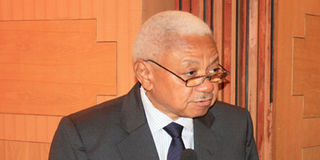CJ: Plea bargaining ideal for TZ

Chief Justice, Mr Mohamed Chande.PHOTO|FILE
What you need to know:
Last year alone for example, according to him, the judiciary recorded 34,319 criminal cases out of which 26,323 cases were filed in the same year.
Dar es Salaam. The judiciary is intending to establish plea bargaining system in a bid to reduce case backlogs and ensure timely delivery of justice as well as reducing inmate congestion in prison facilities.
Plea bargaining system is currently used in the US, Australia, England, Italy and South Africa, amongst other countries.
Under the system, the prosecutor and the accused person enter a plea agreement whereby on one side, the accused voluntarily agrees to plead guilty while on the other hand, the prosecutor agrees to dismiss other charges against the accused or ask the court to reduce the punishment upon conviction.
The Chief Justice, Mr Mohamed Chande Othman, said in Dar es Salaam yesterday that piling up of cases made it difficult for judges and magistrates to deliver justice on time especially in criminal cases, thus there was a need to establish the new system, which he said, has shown success in the US, which is leading in the world for having many criminal cases.
According to him, the judiciary through its regulation committee has been gathering information on plea bargaining by using experience from other countries and that it was currently collecting views on the new system.
“If approved by the government and other stakeholders, it is my expectation that the system will give a breather to our populated prisons countrywide as well as reducing backlog of cases in our various courts which still faces a shortage of human resource,’’ said the Chief Justice.
The CJ who was speaking at the celebrations to mark the country’s Law Day under a theme: ‘Timely Delivery of Justice for All’, said criminal cases were increasing each year thus making it cumbersome to deliver justice on time.
Last year alone for example, according to him, the judiciary recorded 34,319 criminal cases out of which 26,323 cases were filed in the same year.
Already, this year, the judiciary has registered 16,873 criminal cases and 27,000 others are expected to be registered in the course of the year.
In his speech, President Jakaya Kikwete, who graced the function, underscored the need for timely delivery of justice and asked the police, government officials, the Prevention and Combating of Corruption Bureau and the Director of Public Prosecution to work in a unified manner so as to ensure that justice is done.
“For justice to make sense, it has to be provided timely but stakeholders involvement is paramount if efficiency is anything to go by,’’ he said.
For his part, Tanganyika Law Society (TLS) president Francis Stolla touted for introduction of Information Communication Technology (ICT) in the judiciary in order to fast-track hearing and ruling of cases.




